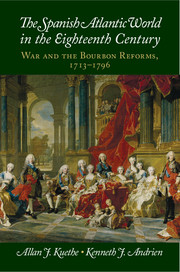Book contents
- Frontmatter
- Contents
- Introduction: War and Reform in Spain and Its Atlantic Empire
- I Alberoni, Patiño, and the Beginnings of Atlantic Reform, 1713–1736
- II The Second Wave of Reform, 1736–1763
- III Pinnacle of the Bourbon Reforms, 1763–1796
- Timeline for the Spanish Atlantic World in the Eighteenth Century
- Bibliography
- Index
- Plate section
- References
Introduction: War and Reform in Spain and Its Atlantic Empire
Published online by Cambridge University Press: 05 June 2014
- Frontmatter
- Contents
- Introduction: War and Reform in Spain and Its Atlantic Empire
- I Alberoni, Patiño, and the Beginnings of Atlantic Reform, 1713–1736
- II The Second Wave of Reform, 1736–1763
- III Pinnacle of the Bourbon Reforms, 1763–1796
- Timeline for the Spanish Atlantic World in the Eighteenth Century
- Bibliography
- Index
- Plate section
- References
Summary
The Contested Bourbon Inheritance
War and reform developed a symbiotic relationship in the Spanish Atlantic world during the eighteenth century. The series of eighteenth-century military conflicts began with the War of the Spanish Succession, fought between 1702 and 1713 over disputed claims to the Spanish throne. When the childless king of Spain, Charles II, lay on his deathbed, he bequeathed his throne to the French Bourbon claimant Philip of Anjou, grandson of Louis XIV of France. The British, Dutch, and later Portuguese allied to support the rival claim of the Hapsburg, Archduke Charles of Austria, fearing the prospect of a powerful Bourbon family dynasty ruling over both France and Spain. Hostilities began in 1702 with an unsuccessful allied attack on Cádiz; but Philip, with a bankrupt treasury and his armed forces in shambles, relied largely on French troops and money to defend his inheritance. The anti-Bourbon alliance attacked next in the Mediterranean theater, seizing Gibraltar in 1704, with Barcelona, Valencia, and Zaragosa falling to the allies in 1706. Once in possession of the whole of the Kingdom of Aragon, Archduke Charles established his court in Barcelona. The next year, an allied force invading from Portugal captured Madrid, but a Bourbon victory at Almansa in 1707 rescued Philip’s cause. The war continued badly for Philip in Iberia, and French defeats in Italy and the Netherlands led Louis XIV to remove his troops from Spain in 1709 as a prelude to opening peace negotiations with the allies.
- Type
- Chapter
- Information
- The Spanish Atlantic World in the Eighteenth CenturyWar and the Bourbon Reforms, 1713–1796, pp. 1 - 28Publisher: Cambridge University PressPrint publication year: 2014

